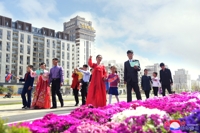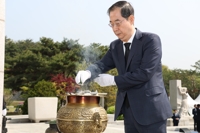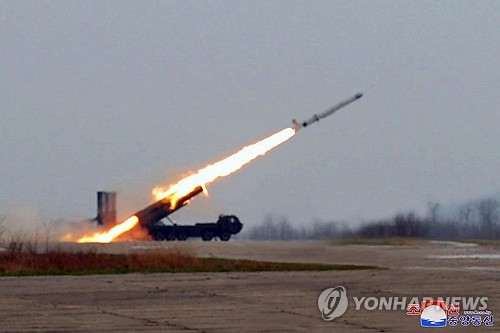Agricultural reforms in N. Korea appear to be working: U.S. expert
By Chang Jae-soon
WASHINGTON, Jan. 27 (Yonhap) -- Agricultural reforms in North Korea, which center on allowing farmers to keep at least one third of their harvests, appear to be working, with overall grain production increasing in recent years despite unfavorable conditions, a U.S. expert said Tuesday.
Randall Ireson, an expert on the North's agricultural sector, also said in a report carried on the website 38 North that this year will be "instructive" in terms of whether the agricultural reforms are fully implemented and if farmers can take advantage of such autonomy to increase production.
In 2012, the North announced the so-called "6.28 measures" that centered on allowing farmers to keep 30 percent of their production quota plus any excess over the quota. Last year, a new set of reforms, known as "5.20 measures," were announced that call for increasing the farmers' portion to 60 percent.
Ireson said the 6.28 measures now appear to be implemented in the North "widely."
The reforms are believed to have contributed to the North's total food production in 2013 reaching an estimated 5.03 million tons, the highest level since the beginning of the country's economic collapse in the early 1990s, Ireson said.
The increase came even though fertilizer availability was worse than the previous year and a period of heavy rain that damaged some crops. Increased production may reflect both increased motivation of farmers, and an increased ability to farm efficiently with limited resources, the expert said.
Production in 2014 is believed to be at least similar to that of the previous year, Ireson said, citing data from the U.N. Food and Agriculture Organization (FAO) that the North's rice production is estimated at 1.9 million tons and maze production at 2.3 million tons.
The New Year's address by North Korean leader Kim Jong-un suggests that the destitute state would push ahead with implementation of the agricultural reforms, the expert said. But he cautioned against being overly optimistic.
"Let's not be overly ebullient. The actions to date do not constitute a Chinese- or Vietnamese-style economic reform, and the DPRK (North Korea) will remain food-insecure for the immediate future. Rollbacks and opposition to other recent changes in farm policy argue for a wait-and-see approach," he said.
"At the farm level, the coming year will be instructive, both in terms of whether the 6.28 and 5.30 policies are fully implemented, and whether farmers can take advantage of this new autonomy to increase production," he said.
jschang@yna.co.kr
(END)
-
 Overdue debut of Korean abstract art pioneer Yoo Young-kuk at Venice Biennale
Overdue debut of Korean abstract art pioneer Yoo Young-kuk at Venice Biennale -
 Defense chief says N. Korea's hypersonic missile 'unsuccessful' in last-stage glide flight
Defense chief says N. Korea's hypersonic missile 'unsuccessful' in last-stage glide flight -
 Relax, immerse yourself in scents at Venice Biennale's Korean Pavilion
Relax, immerse yourself in scents at Venice Biennale's Korean Pavilion -
 N. Korea has capability to genetically engineer biological military products: U.S. report
N. Korea has capability to genetically engineer biological military products: U.S. report -
 S. Korea marks 30th anniv. of Korean Pavilion at Venice Biennale with contemporary art
S. Korea marks 30th anniv. of Korean Pavilion at Venice Biennale with contemporary art
-
 Overdue debut of Korean abstract art pioneer Yoo Young-kuk at Venice Biennale
Overdue debut of Korean abstract art pioneer Yoo Young-kuk at Venice Biennale -
 Relax, immerse yourself in scents at Venice Biennale's Korean Pavilion
Relax, immerse yourself in scents at Venice Biennale's Korean Pavilion -
 Artist Lee Bae captures ethereal Korean aesthetics at Venice Biennale
Artist Lee Bae captures ethereal Korean aesthetics at Venice Biennale -
 S. Korea marks 30th anniv. of Korean Pavilion at Venice Biennale with contemporary art
S. Korea marks 30th anniv. of Korean Pavilion at Venice Biennale with contemporary art -
 Defense chief says N. Korea's hypersonic missile 'unsuccessful' in last-stage glide flight
Defense chief says N. Korea's hypersonic missile 'unsuccessful' in last-stage glide flight
-
 Gov't likely to accept university chiefs' request to lower med school enrollment quota
Gov't likely to accept university chiefs' request to lower med school enrollment quota -
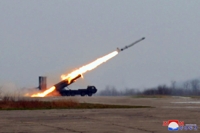 N. Korea says it conducted 'super-large warhead' test for strategic cruise missile
N. Korea says it conducted 'super-large warhead' test for strategic cruise missile -
 (LEAD) Yoon proposes first-ever meeting with opposition leader
(LEAD) Yoon proposes first-ever meeting with opposition leader -
(URGENT) N. Korea conducted 'super-large warhead' test for strategic cruise missile: KCNA
-
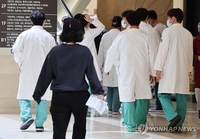 (LEAD) Gov't accepts university chiefs' request on med school enrollment quota: PM
(LEAD) Gov't accepts university chiefs' request on med school enrollment quota: PM














